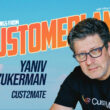The future of data collection will focus on earning consented data from consumers directly. Rather than web scraping, it will be more transparent. That’s a good thing!
According to Forrester, one in four Chief Marketing Officers (CMOs) will invest in consent and preference management in 2021. This is against a backdrop of increased regulation that is forcing marketers to reassess the ways they collect and manage consumer data.
by Michael Fisher, CEO at 3radical
CMOs are concerned (and if they’re not, they should be) about how they’re going to obtain data going forward. After all, marketers have traditionally bought a lot of the stuff; having had access to aggregated information on demographics and consumer behavior, for the right price of course. But that’s changing.
The sources they have relied upon are highly unlikely to be available in the near future and long-established data collection methods are coming under ever-increasing levels of scrutiny.
In Europe for example, General Data Protection Regulation (GDPR) requires organizations to obtain explicit consent when gathering and processing data from individuals (amongst many other things). The US is catching up in legislation – ex: the California Consumer Privacy Act (CCPA) – giving citizens the right to know their personal data is being collected, the right to have their data deleted, and the right to opt out of the sale of their personal information. Nine states are debating similar legislation and 25 others are considering privacy law in some form.
This isn’t a bad thing by the way. In new research we’ve just undertaken across the UK, US and Singapore, 90 percent of the consumers surveyed said online brand experiences needed to improve and 68 percent say their contact information (commonly needed in marketing activation) is the data they’re least willing to share. The old ways don’t necessarily create the best experiences for brands or consumers, as they’ve relied on data scraping and inference. Who hasn’t been followed around online by variations of products they have no interest in buying because of prior searches?
How companies obtain data and how they subsequently use it is becoming increasingly important to customers. Consumers are much more aware of the value of their data, along with the risks associated with data breaches. 77 percent of US consumers are using at least one online privacy preserving tool. DuckDuckGo, a privacy preserving competitor to Google, has seen a 65 percent year over year increase in traffic, for example.
Forrester research shows that 71 percent of US adults are aware that apps and websites collect their information and activities, but that 65 percent think it’s wrong for brands to track them across devices in order to tailor ads. That’s not because consumers don’t want relevant ads, but because it happens without their permission, which is seen as somewhat creepy and intrusive.
In parallel to all of this, consumers expect an ever-increasing level of service and personalization. Quite the challenge then!
As regulation tightens and consumers guard the information that brands value the most (while expecting ever improving digital experiences), marketers must seize engagement opportunities to earn consumer data.
The Main Challenges In Collecting, Managing, and Using Data Today
A phrase sticks in my mind; there’s often been a “dangerous mindset of data entitlement.” It’s an eloquent way of referring to the all too familiar practice of collecting and using information with little regard from those that ‘lent’ it in the first place.
It was interesting to see research from the World Federation of Advertisers (WFA) reveal that almost three-quarters (74 percent) of Chief Marketing Officers (CMOs) expect ‘Data Ethics’ to become more important in their roles over the next five years. The approach being advocated is that Data Ethics isn’t just about adhering to GDPR, CCPA or similar regulatory implementation but going beyond it; moving “from a mindset of ‘data first’ to ‘people first’. It should then, not be about finding ways around restrictions, but accepting that the old ways are simply not sustainable.
The challenge for brands this year will be around avoiding just tinkering with the old approaches and instead making real sustainable change. One only needs to look at cookie banners, which are little more than a legal way for brands to cover themselves to try and carry-on doing things as they were before. They rarely promote any level of engagement or any real value and permission requests are often quickly denied.
If marketers are only looking to put band-aids on wounds that are actually worsening, they’re in trouble. I’d suggest they need to be reevaluating their fundamental approach and embracing building real, mutually beneficial relationships with consumers, while appreciating it is very much the consumers who are in the driver seat now.
Technology Should CMOs Be Looking At
People want to know what their data is being used for – and we’re not talking about 30-page long privacy policies here. This relies upon absolute transparency and a foundation of trust. It also requires consumers to proactively volunteer their data, and the only way that’s ever going to happen is if marketers learn to ask the right questions in the right ways.
Marketers are going to have to become much better at this. It can’t be, “here are 50 things we want to know about you”, which is all about ‘me, me, me the marketer’. It’s got to be about what the consumer wants to share and for their benefit. The right questions are not necessarily the ones marketers want to ask, but those that consumers want to answer. Determining these questions is trial and error. The only way it works is if consumer data is treated as a privilege, rather than simply a value asset. This is going to be a skill many have to learn. Lots of marketers have been revenue focused and, whether they like to admit it or not, see consumers as a means to an end. There needs to be an inversion that puts consumers first and revenue second.
Very few organizations do this very well at the moment.
However, there are new and creative methods of data collection which are generating great results. Gamification tech (which is part of what we do) is a really effective approach because it’s completely aligned to the shift marketers need to make. Brands can collect information from consumers in a way that’s engaging and fun in-and-of itself. Data exchange can be incentivized, adding motivation and appropriate value exchange. To that, the experience of giving data can also be made inherently enjoyable.
3radical specializes in gamification mechanics, behavioral sciences, and ‘earned data’. To give you an example; we work with Giving Assistant, which makes it easy for shoppers to earn cashback on purchases, and to donate part of (or all of) their savings to good causes. People quickly understand the value proposition. That’s the easy part! The challenge is honing the experience to such a degree that people seamlessly benefit (and enjoy benefiting) from the platform whenever they shop online.
We work together on ‘stickiness’ at the beginning of our user journey and to cement real connections between users and our clients. The point where users first sign-up is critically important. We work to establish sophisticated progression models that ultimately help individuals make best use of the experience. To do that we need information. 3radical’s gamification software perfectly suits that need because it attracts and retains the attention of users through fun, interactive, value exchanges that are also rewarding. That data then only further improves the experience and cements the relationship! Giving Assistant is a remarkable company that has raised over $5,700,000 for nonprofits so far, and is taking a really modern, forward thinking approach to gathering consent-driven consumer data.
How Can Brands Differentiate?
If you look at the brands doing data well, they provide consumer engagements that offer ongoing, organic value, and get accurate, actionable intel in return. Take casual dining brands that provide complimentary apps and services for customers, whether they be interactive games with real prize incentives, table service, the opportunity to provide feedback directly to the kitchen, or whatever they may be – they’re providing things that are genuinely relevant and fostering a community. They’re also highly effective data gatherers. The fitness industry, where brands provide complimentary apps and services for customers to track and share achievements, is another big success story right now. Data collection doesn’t need to be forced.
The future of data collection will focus on earning consented data from consumers directly. Rather than web scraping, it will be more transparent. That’s a good thing!
A huge value of earned data is the context it gives. Earned information is shared directly and contextualized by the consumer themselves rather than assumed or inferred.
‘Earned data’ is a different beast because it’s openly obtained and allows for deeper levels of engagement that help brands better serve consumers. That’s it. It helps consumers get better service. It’s not necessarily the same then, as personalization. Businesses don’t need to know everything about consumers (and it’s highly unlikely that consumers would want them to). We must move beyond purely transactional engagements, to understanding intent and sentiment, but we must do so with consumers fully in control.
What CMOs Need to Consider When Evaluating Their Options
New regulation shouldn’t be seen as obstacles to overcome, but rather as opportunities to do things differently; to do them better.
It’s not like the old ways were perfect. Certainly not. Tech giants have had incredible levels of access to our online movements and activities, and inferences are made based on our activity. But it’s actually quite difficult to understand our behavior without context. Take a look at the profile Google has predicted for you: head to the Google account homepage by clicking the widget in the top right corner of any Google site. Click through to “Privacy & personalization” and then “Manage your data & personalization”. The profile Google has predicted for you is under “Ad personalization.” Does the profile represent you as a person? Does it reflect your true motivations? Your behaviors? You?
We believe ‘Earned data’, obtained through transparent value exchange, is far more powerful. It’s the quality of the data that counts, not the volume. It’s better to have a beautiful data pond than a polluted data ocean.
 Michael Fisher, Ed.D. is CEO of 3radical and is a board member at TheCustomer.
Michael Fisher, Ed.D. is CEO of 3radical and is a board member at TheCustomer.













Great article. So is 3radical now positioning itself to sell to companies interested in adding consent data to their marketing efforts? Curious as to what types of results you get from gamification and earned data.
Hi Curt – Yes they are. I’d be happy to put you in touch with 3radical if you’re open to a conversation.
Sure be happy to talk!
Their CEO, Michael Fisher, is also a member of our board. Easy to, and happy to make the connection. I’ll send an email to you both shortly.
Great article. So is 3radical now positioning itself to sell to companies interested in adding consent data to their marketing efforts? Curious as to what types of results you get from gamification and earned data.
Hi Curt – Yes they are. I’d be happy to put you in touch with 3radical if you’re open to a conversation.
Sure be happy to talk!
Their CEO, Michael Fisher, is also a member of our board. Easy to, and happy to make the connection. I’ll send an email to you both shortly.